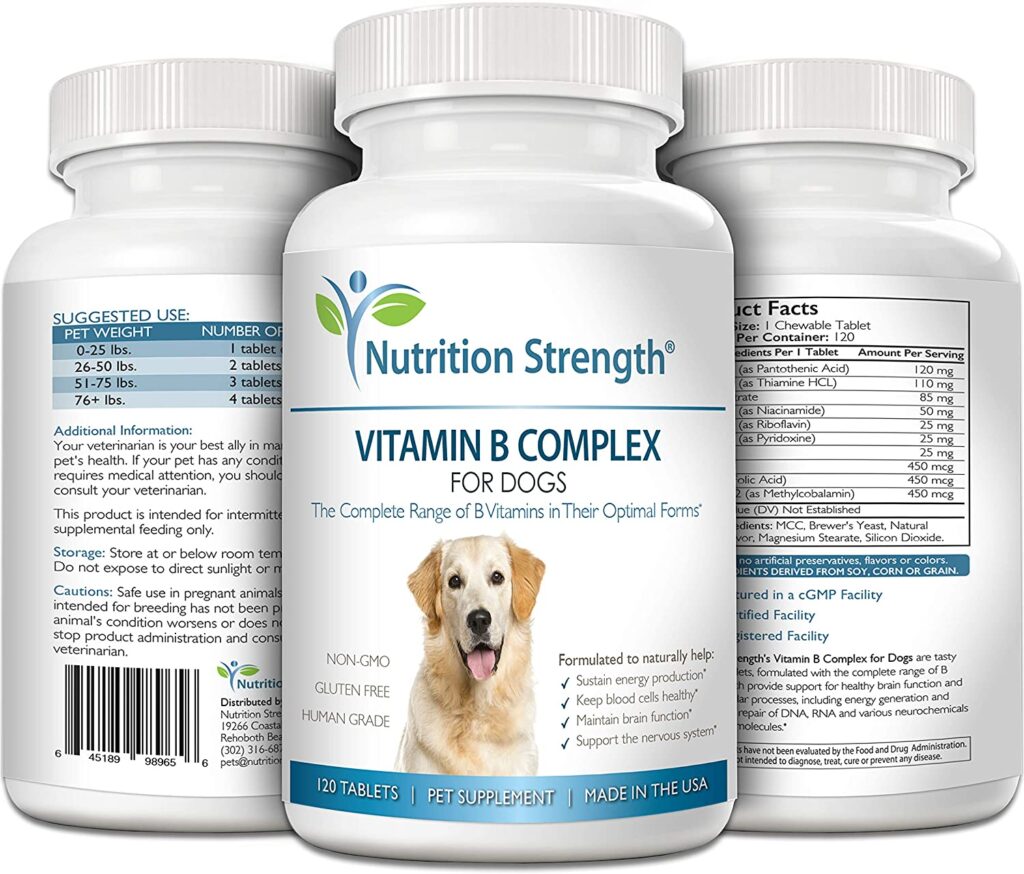Thiamine for Dogs: Why Your Pet Needs It
Your canine will benefit from a diet high in Vitamin B1 or exclusively added thiamine for dogs. However, he cannot absorb the mineral directly from the food he consumes.
As a result, we can see the development of thiamine deficiency. That life-threatening condition may be visible because of several known symptoms, such as loss of appetite, weight loss, and GI irritation.
Extreme instances may result in cardiac issues, leading to the death of your four-legged furry friend. So, the only way to guarantee he reaps the advantages of this mineral is to give him a thiamine supplement for dogs.
But what exactly is thiamine, and is it harmful to your dog? In this article, we will discuss the advantages of vitamin B1 for dogs, as well as what thiamine deficiency is and how to cure it. So, let us review what we know about all of this.
Table of Contents
- What Is Vitamin B1 (Thiamin)?
- Sources of Vitamin B1
- Thiamine Dosage in Dogs
- What Is Thiamine Deficiency?
- Symptoms of Thiamine Deficiency in Dogs
- Causes of Thiamine Deficiency in Dogs
- Diagnosis of Thiamine Deficiency in Dogs
- Treatment of Thiamine Deficiency in Dogs
- Recovery of Thiamine Deficiency in Dogs
- The Takeaway
- Nutrition Strength Vitamin B for Dogs
Check out our Nutrition Strength Vitamin B for Dogs here.
What Is Vitamin B1 (Thiamine)?
Vitamin B1, commonly known as thiamine for dogs, is a water-soluble vitamin required for glucose, amino acid metabolism and energy generation.
Thiamine in dogs is readily absorbed through the intestinal mucosa via active carrier-mediated transport and passive diffusion.
Once in the enterocyte, thiamine may be transformed into thiamine pyrophosphate (also known as TPP) for immediate usage in the cell and the processes happening there. It can be delivered to the liver as thiamin through portal circulation.
Once in the liver, it spreads quickly throughout the body. Thiamine in dogs is detected as a free vitamin in plasma.
However, it is mainly found as part of TPP in erythrocytes and leukocytes. Thiamine is not stored in the body and is filtered continuously by the renal tubules.
Thiamine is necessary for creating a coenzyme utilized in energy generation and transketolase enzymes employed in glucose metabolism.
During amino acid and glucose metabolism, thiamine as TPP is responsible for the decarboxylation of ketoacids and acetyl-CoA derivatives.
Transketolase, a TPP-dependent enzyme, is also involved in glucose and ribose production through the pentose phosphate route. Thiamine is one of the essential nutrients associated with refeeding syndrome’s clinical consequences.
When chronically malnourished animals are given a big bolus of rapidly absorbed carbohydrates without an appropriate quantity of rate-limiting critical elements, notably thiamine, potassium and magnesium, refeeding syndrome may ensue.
If left untreated, the intracellular transfer of these nutrients may lead to the development of quick and severe clinical symptoms, culminating in the animal’s death.
Sources of Vitamin B1
Quality dry kibble may provide enough thiamine for dogs, but this is not always the point. The problem is that vitamin B1 is unstable due to its sensitivity to heat and water.
Commercially available dog food is often treated in vast volumes of heat and moisture, depleting the vitamin.
As a result, the only way for him to acquire vitamin B1 is via a raw food diet and pet pills. Thiamine for dogs may be found in various types of meat and whole grains.
If you have moved your dog to a raw diet, ensure he gets lots of organ meat, such as liver and kidneys. You may also wish to include some whole grains, which contain thiamine.
Pet supplements ensure that your dog receives the required dosage of vitamin B1. The number of nutrients you give your dog may vary depending on age, size and condition. More active or sicker dogs will need more thiamine for optimal health.
Thiamine Dosage in Dogs
The only way to determine what amount of thiamine your dog need is to first speak with a certified veterinarian.
They will be able to lead you to Vitamin B1 supplements for dogs that are mainly made for your dog’s breed. Furthermore, thiamine supplement for dogs is available in oral pills, ingestible powder or injectable solutions.
What Is Thiamine Deficiency?
We already mentioned the main functions of Vitamin B1. To conclude, thiamine is used for glucose metabolism and energy generation. As it is not stored in the body, it must be replaced regularly.
A shortage, known as thiamine deficiency, is often caused by low thiamine content in commercial dog food. That is because the vitamin is heat sensitive and may be degraded during cooking.
Inadequate thiamine levels may also be seen in vegetarian, homemade and raw meat diets. Foods containing sulfur dioxide, sulfite preservatives or thiaminases may also degrade thiamine, rendering it inert and unable to be digested.
Drugs that promote fluid loss, such as diuretics, may deplete the body of thiamine. Different intestinal illnesses can stop the body from absorbing this essential vitamin. In most situations, thiamine supplementation may result in complete recovery.
Thiamine deficiency in dogs may develop when enough thiamine, or Vitamin B1, is not consumed or is not absorbed in the digestive system.
This relatively avoidable illness might lead to significant health concerns if not managed. Symptoms begin in the gastrointestinal tract and may spread to the circulatory and neurological systems, with severe instances resulting in bleeding and the destruction of brain tissue.
This minor vitamin shortage may be lethal if left unchecked.
Symptoms of Thiamine Deficiency in Dogs
Symptoms of thiamine deficiency in your dog may occur over days to weeks. You can observe one or more of the following signs:
- Anorexia.
- Weight loss.
- Vomiting.
- Lethargy.
- Lack of appetite.
- Gastrointestinal issues.
- Unequal pupil sizes.
- Decreased pupil light response.
- Involuntary eye movement.
- Mental problems.
- Eyeball protrusion.
- Muscle spasms.
- Nervous system issues.
- Abnormal behavior.
- Seizures.
- Neuromuscular weakness.
- Loss of body movement control.
- Rapid heart rate.
- Heart problems.
Causes of Thiamine Deficiency in Dogs
There are many reasons for lacking vitamin B1 in your dog’s body. The following are some of the causes of thiamine deficiency:
- Low thiamine concentration in the diet.
- Diet including sulfur dioxide or sulfite preservatives.
- Diet high in carbohydrates.
- Malabsorptive intestinal disease.
- Diseases that inhibit thiamine usage, such as liver disease.
Diagnosis of Thiamine Deficiency in Dogs
When diagnosing thiamine deficiency, your veterinarian will consider any current symptoms, food history, test findings and treatment response.
If a thiamine shortage is suspected, the vitamin B1 concentrations in plasma, blood, urine or saliva may be measured.
The erythrocyte transketolase assay directly analyzes thiamine pyrophosphate in red blood cells from a blood sample. It is the most often used test for this condition.
High-pressure liquid chromatography, or HPLC, is another test that evaluates thiamine levels and may assist in differentiating between thiamine deficient and normal animals.
Because the symptoms of this ailment are similar to those of many other medical conditions, your veterinarian may need to perform a battery of further tests.
That will happen before concluding that your dog’s problem is due to thiamine deficiency. These assays include complete blood counts, serum biochemistry, bile acid concentration testing, folic acid and cobalamin concentration testing, liver function tests and EKGs.
If neurological abnormalities are discovered, MRIs of the brain may be conducted, leading to a thiamine deficiency diagnosis.
Urinalysis is often used to detect electrolyte and metabolic disorders. A urine sample may also be subjected to gas chromatography-mass spectrometry to detect quantities of amino acids, organic acids, sugars, sugar alcohols, nucleosides and, most critically, purine and pyrimidine bases.
Treatment of Thiamine Deficiency in Dogs
Once a diagnosis of thiamine deficiency is confirmed, therapy tries to restore the balance by reintroducing thiamine into your dog’s system.
An intramuscular injection of thiamine pyrophosphate is usually given for 3 to 5 days, followed by 2 to 4 weeks of oral therapy.
Although intravenous injection is possible, it is often avoided owing to the danger of hypotension and arrhythmias.
A multivitamin containing thiamine may be suggested to ensure your dog’s vitamin levels are balanced.
We also have to mention that thiamine for dogs’ anxiety is one of the best treatments known by scientists.
More fluid treatment may be required to balance electrolytes. Following therapy, MRIs and urine tests may assess for symptom regression.
Your veterinarian will recommend dietary changes to remove items that impact thiamine levels and have inadequate vitamin quantities.
The vet will suggest more balanced diets that include thiamine-rich foods for dogs. If an underlying ailment, such as a gastrointestinal problem, is discovered, your veterinarian will also treat it.
If treated early, the response is typically satisfactory, but if neurological indications appear, there may be persistent issues. Euthanasia or death may occur in exceptional instances.
Recovery of Thiamine Deficiency in Dogs
You may need to give your dog nutrients when you return from the veterinarian facility. The most crucial step in ensuring healthy nutrition is avoiding sulfur-containing meals.
Examine the thiamine levels in your dog’s diet to ensure they are enough and viable. The AAFCO (Association of American Feed Control Officials) has suggested that adult dog food has 1 mg of thiamine per kilogram.
The Takeaway
Thiamine, or vitamin B1, must be added to dog food. It helps high-energy organs digest carbs. Dogs with thiamine deficiency have anorexia, weight loss and GI discomfort.
Neuromuscular weakness, unequal pupil widths and reduced light reactivity worsen as symptoms progress. Extremes induce heart problems or death.
Pet food was recalled in the previous 5 years due to insufficient thiamine. This vitamin is heat- and water-sensitive. Thus it can’t be cooked.
Diuretics deplete thiamine in dogs. Low absorption requires a thiamine supplement for dogs. All factors may induce dog thiamine deficiency, so that is why you have to be very careful.
Nutrition Strength Vitamin B for Dogs
Check out our Nutrition Strength Vitamin B for Dogs here.
Nutrition Strength Vitamin B for Dogs, Complete B Complex for Dogs, Promote Blood Cell & Nervous System Health, Help Sustain Cellular Energy Production & Maintain Brain Function are tasty chewable tablets, made with the complete range of B vitamins, which take a vital part in crucial cellular processes, acting as coenzymes in a great number of catabolic and anabolic enzymatic reactions.
Critically, B vitamins lend support for healthy brain function, including energy generation, synthesis and repair of DNA and RNA, in addition to taking part in the synthesis of various neurochemicals and signaling molecules.
A great way to support your dog’s well-being, our tasty B complex for dogs supplement could benefit your four-legged friends by helping to:
- Keep your pet’s blood cells healthy.
- Maintain cellular energy production.
- Sustain healthy brain function.
- Strengthen the nervous system.
- Support healthy metabolism.
Our specially-made vitamin B complex for dogs is formulated to help ensure that your four-legged best friend gets adequate levels of the eight B-vitamins, which are essential for optimal physiological and neurological functioning.
Furthermore, research has shown that a great number of our dogs may suffer from deficiencies or inadequate levels of one or more members of this important group of micronutrients.
Altogether, the research suggests that, in the absence of optimal diet, supplementation of the entire group of B vitamins, rather than administering only one, two or three compounds, might be beneficial for preserving brain health, as long as it is done in sufficient doses.
The B group of vitamins includes thiamine (B1), riboflavin (B2), niacin (B3), pantothenic acid (B5), vitamin B6, biotin (B7), folate (B9) and vitamin B12.
Image source: Wikimedia / Jelene Morris.




